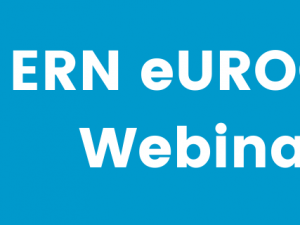For the recent Conference on Rare Diseases and the European Reference Networks, ERN eUROGEN agreed to reimburse the attendance of Samuel Carlsen, a patient advocate from Denmark. Samuel has muscular dystrophy, which affects his eyes, digestive system, legs, and bladder and underwent valve ablation surgery as a baby due to posterior urethral valves.
Samuel has now signed a Supporting Patient Partner agreement with the network and has provided a patient view of the conference, which you can read below.
Conference Review by Samuel Carlsen
 I recently attended the Conference on Rare Diseases and the European Reference Networks (ERNs) in Bilbao, Spain. As a multidisciplinary patient with a wealth of personal experience but limited political knowledge, I’d like to share my thoughts on the conference.
I recently attended the Conference on Rare Diseases and the European Reference Networks (ERNs) in Bilbao, Spain. As a multidisciplinary patient with a wealth of personal experience but limited political knowledge, I’d like to share my thoughts on the conference.
In general, I found that many of the speakers had valuable insights, and I largely agreed with their points. Here are some key takeaways:
Knowledge Sharing: During the “Consolidation, Future, and Integration into EU Health Systems” talk, a crucial point was raised about sharing information. It was emphasized that we should invest as many resources in making existing knowledge accessible as we do in acquiring new knowledge. This resonated with me because using resources to duplicate research efforts is inefficient. If we all had access to the same knowledge, we could work more effectively.
Patient Input: Julian Grosskreutz’s contributions during the talk on Research in ALS stood out. He emphasized patient involvement and the openness of medical professionals by asking the patient one simple question: “What do you think the cause is?”. This often leads to a highly relevant answer that, in some cases, could lead to a new approach and, therefore, better diagnosis and care. Recognizing patients as experts in their own lives is vital, especially those with complex and chronic diseases.
Post-Hospital Care: The conference also addressed the importance of post-hospital care. It was highlighted that the social systems should focus on enabling patients to live with their diseases on the best possible terms rather than just treatment and cure. I wholeheartedly agree with this approach.
However, from my perspective, there were some shortcomings in the conference. I observed repetition in discussions and felt that more diverse viewpoints could have been beneficial. It would have been valuable to include discussion panels to encourage open dialogue, especially for those who may not have shared the prevailing opinions.
Additionally, the political aspects and rhetoric of the conference left many of the talks a bit shallow and with a too general viewpoint. A comprehensive explanation of the ERN system would have made the information more relatable. I suggest having concrete examples, case reports, and personal stories from patients and physicians to help explain some of the different mechanisms with regard to their problems and proposed solutions. Multiple smaller presentations on specific topics, where attendees could voice their opinions and choose their areas of interest, could have been more engaging and informative.
Another issue was the lack of networking opportunities. Networking was a challenge for me, as I didn’t get the chance to interact with others who could have clarified my questions. Including identification cards with organization and country details would have been a simple solution to facilitate networking and discussions.
Conferences like this are vital in bringing attention and resources to important issues, which is why we must use them effectively. While this conference had many positives, there is room for improvement. By diversifying discussions, making the content more accessible, and facilitating networking, future conferences can be even more impactful.
Thank you for the opportunity to attend, and I hope my suggestions can contribute to the continued success of such conferences.




